Organisational Behaviour Report: Virgin Media and Leadership Styles
VerifiedAdded on 2019/12/03
|10
|3598
|381
Report
AI Summary
This report delves into the intricacies of organisational behaviour, commencing with an exploration of diverse organisational structures like functional, divisional, and matrix structures, juxtaposed with various cultural models such as bureaucratic and role cultures. It elucidates the interconnectedness of organisational structure and culture, emphasizing their influence on employee behaviour, particularly within the context of Virgin Media Plc. The report then examines factors impacting individual behaviour, including personal, environmental, and organisational elements. It contrasts leadership styles, specifically autocratic and participative approaches, and their impact on organisational success, using Virgin Media and Vodafone as case studies. Furthermore, the report discusses organisational theories, principles, and management approaches, such as scientific management and human behaviour approaches. It also investigates the impact of leadership styles on employee motivation and explores motivational theories like Maslow's and Herzberg's theories, highlighting their practical applications and usefulness in enhancing workforce morale and performance. The report concludes by emphasizing the importance of adapting leadership and motivational strategies to specific situations and employee needs.
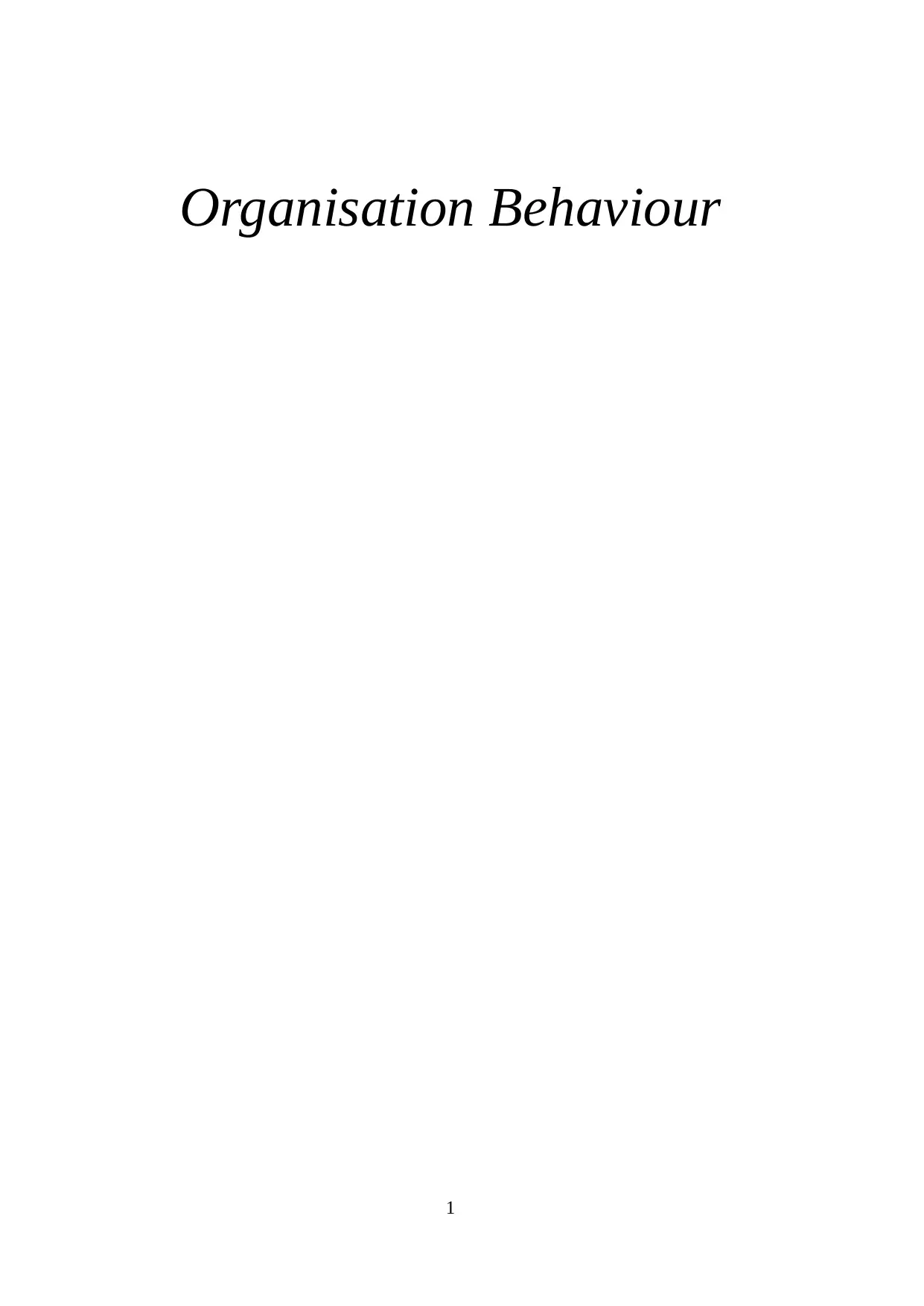
Organisation Behaviour
1
1
Paraphrase This Document
Need a fresh take? Get an instant paraphrase of this document with our AI Paraphraser
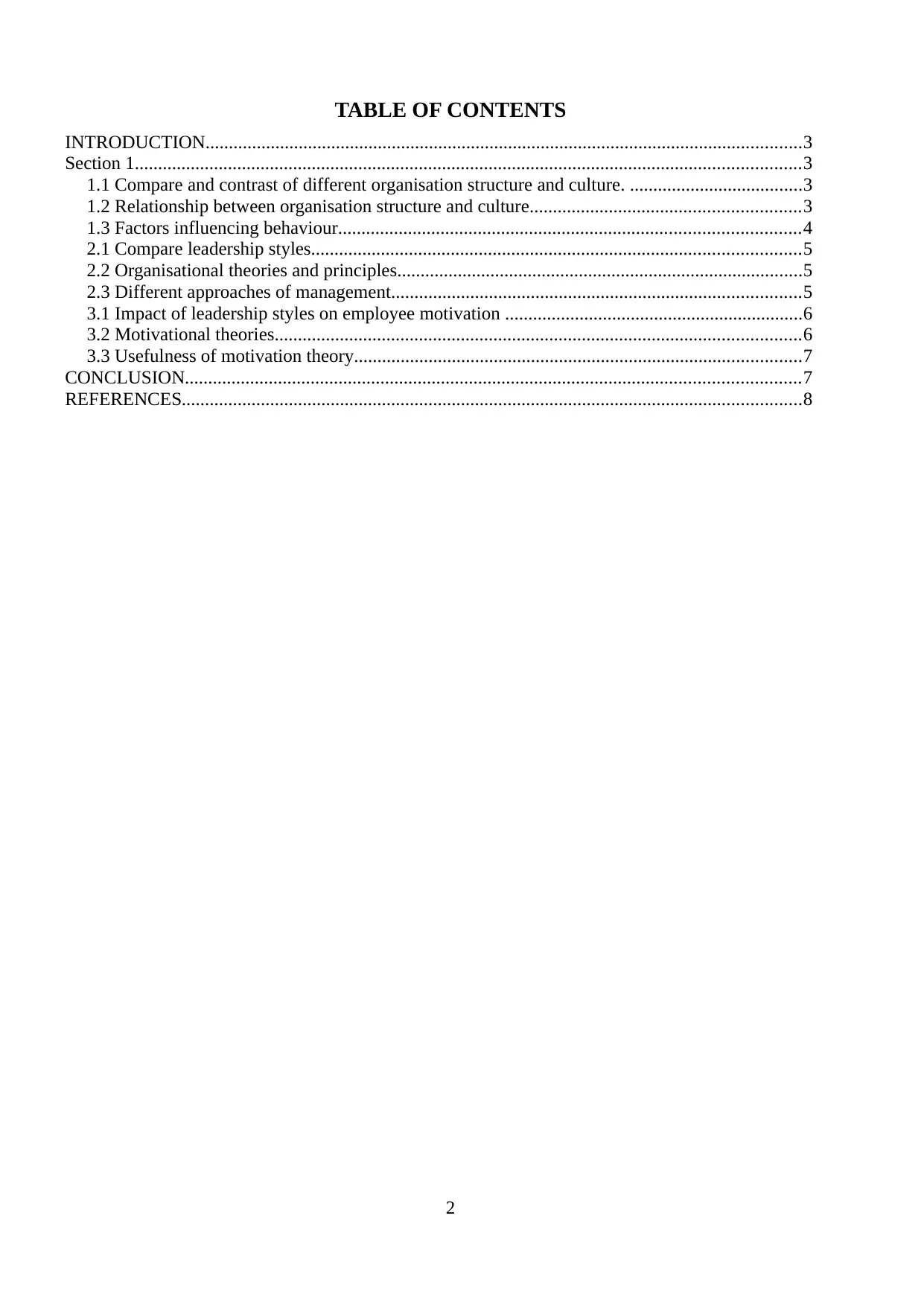
TABLE OF CONTENTS
INTRODUCTION................................................................................................................................3
Section 1...............................................................................................................................................3
1.1 Compare and contrast of different organisation structure and culture. .....................................3
1.2 Relationship between organisation structure and culture..........................................................3
1.3 Factors influencing behaviour...................................................................................................4
2.1 Compare leadership styles.........................................................................................................5
2.2 Organisational theories and principles.......................................................................................5
2.3 Different approaches of management........................................................................................5
3.1 Impact of leadership styles on employee motivation ................................................................6
3.2 Motivational theories.................................................................................................................6
3.3 Usefulness of motivation theory................................................................................................7
CONCLUSION....................................................................................................................................7
REFERENCES.....................................................................................................................................8
2
INTRODUCTION................................................................................................................................3
Section 1...............................................................................................................................................3
1.1 Compare and contrast of different organisation structure and culture. .....................................3
1.2 Relationship between organisation structure and culture..........................................................3
1.3 Factors influencing behaviour...................................................................................................4
2.1 Compare leadership styles.........................................................................................................5
2.2 Organisational theories and principles.......................................................................................5
2.3 Different approaches of management........................................................................................5
3.1 Impact of leadership styles on employee motivation ................................................................6
3.2 Motivational theories.................................................................................................................6
3.3 Usefulness of motivation theory................................................................................................7
CONCLUSION....................................................................................................................................7
REFERENCES.....................................................................................................................................8
2
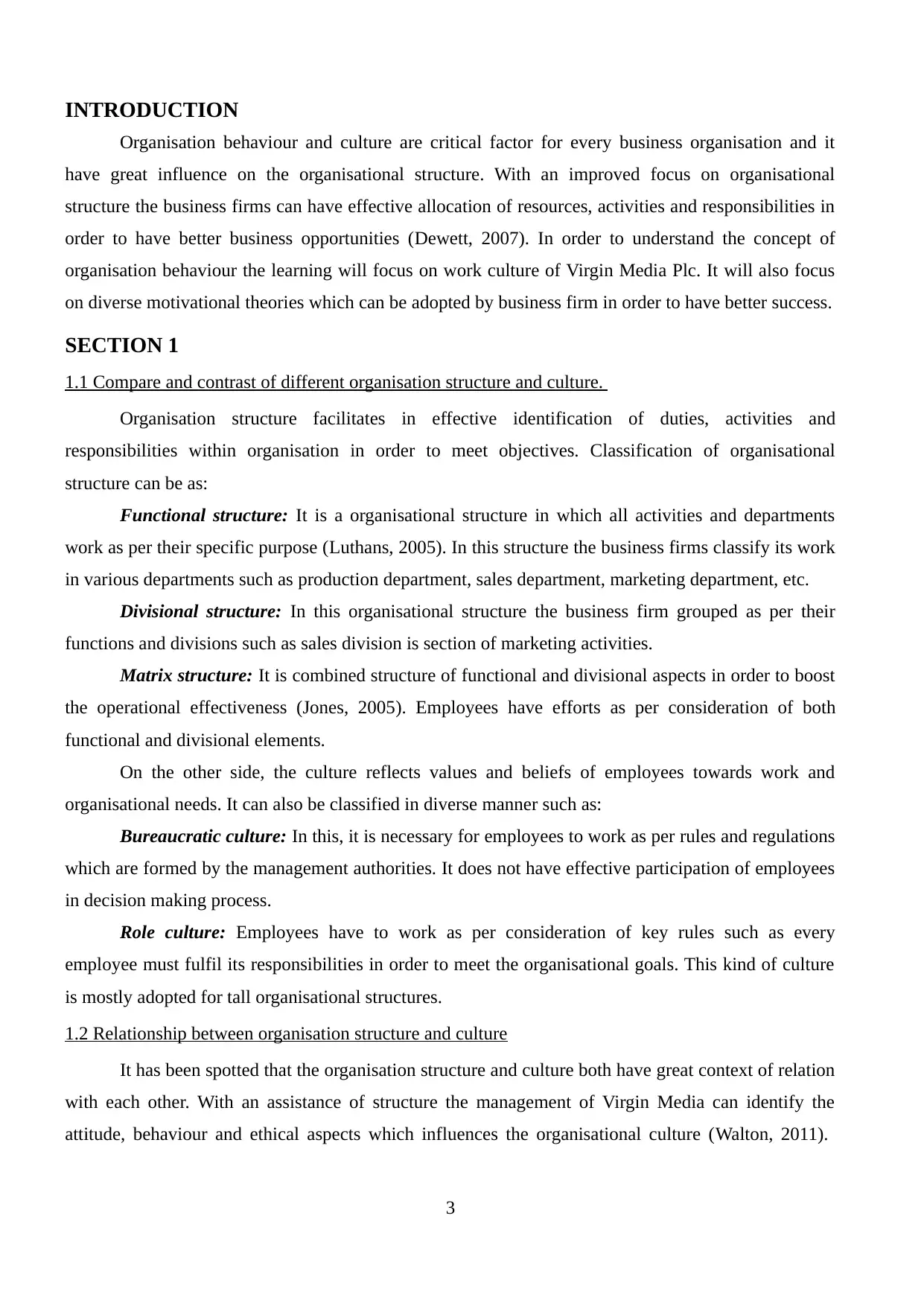
INTRODUCTION
Organisation behaviour and culture are critical factor for every business organisation and it
have great influence on the organisational structure. With an improved focus on organisational
structure the business firms can have effective allocation of resources, activities and responsibilities in
order to have better business opportunities (Dewett, 2007). In order to understand the concept of
organisation behaviour the learning will focus on work culture of Virgin Media Plc. It will also focus
on diverse motivational theories which can be adopted by business firm in order to have better success.
SECTION 1
1.1 Compare and contrast of different organisation structure and culture.
Organisation structure facilitates in effective identification of duties, activities and
responsibilities within organisation in order to meet objectives. Classification of organisational
structure can be as:
Functional structure: It is a organisational structure in which all activities and departments
work as per their specific purpose (Luthans, 2005). In this structure the business firms classify its work
in various departments such as production department, sales department, marketing department, etc.
Divisional structure: In this organisational structure the business firm grouped as per their
functions and divisions such as sales division is section of marketing activities.
Matrix structure: It is combined structure of functional and divisional aspects in order to boost
the operational effectiveness (Jones, 2005). Employees have efforts as per consideration of both
functional and divisional elements.
On the other side, the culture reflects values and beliefs of employees towards work and
organisational needs. It can also be classified in diverse manner such as:
Bureaucratic culture: In this, it is necessary for employees to work as per rules and regulations
which are formed by the management authorities. It does not have effective participation of employees
in decision making process.
Role culture: Employees have to work as per consideration of key rules such as every
employee must fulfil its responsibilities in order to meet the organisational goals. This kind of culture
is mostly adopted for tall organisational structures.
1.2 Relationship between organisation structure and culture
It has been spotted that the organisation structure and culture both have great context of relation
with each other. With an assistance of structure the management of Virgin Media can identify the
attitude, behaviour and ethical aspects which influences the organisational culture (Walton, 2011).
3
Organisation behaviour and culture are critical factor for every business organisation and it
have great influence on the organisational structure. With an improved focus on organisational
structure the business firms can have effective allocation of resources, activities and responsibilities in
order to have better business opportunities (Dewett, 2007). In order to understand the concept of
organisation behaviour the learning will focus on work culture of Virgin Media Plc. It will also focus
on diverse motivational theories which can be adopted by business firm in order to have better success.
SECTION 1
1.1 Compare and contrast of different organisation structure and culture.
Organisation structure facilitates in effective identification of duties, activities and
responsibilities within organisation in order to meet objectives. Classification of organisational
structure can be as:
Functional structure: It is a organisational structure in which all activities and departments
work as per their specific purpose (Luthans, 2005). In this structure the business firms classify its work
in various departments such as production department, sales department, marketing department, etc.
Divisional structure: In this organisational structure the business firm grouped as per their
functions and divisions such as sales division is section of marketing activities.
Matrix structure: It is combined structure of functional and divisional aspects in order to boost
the operational effectiveness (Jones, 2005). Employees have efforts as per consideration of both
functional and divisional elements.
On the other side, the culture reflects values and beliefs of employees towards work and
organisational needs. It can also be classified in diverse manner such as:
Bureaucratic culture: In this, it is necessary for employees to work as per rules and regulations
which are formed by the management authorities. It does not have effective participation of employees
in decision making process.
Role culture: Employees have to work as per consideration of key rules such as every
employee must fulfil its responsibilities in order to meet the organisational goals. This kind of culture
is mostly adopted for tall organisational structures.
1.2 Relationship between organisation structure and culture
It has been spotted that the organisation structure and culture both have great context of relation
with each other. With an assistance of structure the management of Virgin Media can identify the
attitude, behaviour and ethical aspects which influences the organisational culture (Walton, 2011).
3
⊘ This is a preview!⊘
Do you want full access?
Subscribe today to unlock all pages.

Trusted by 1+ million students worldwide
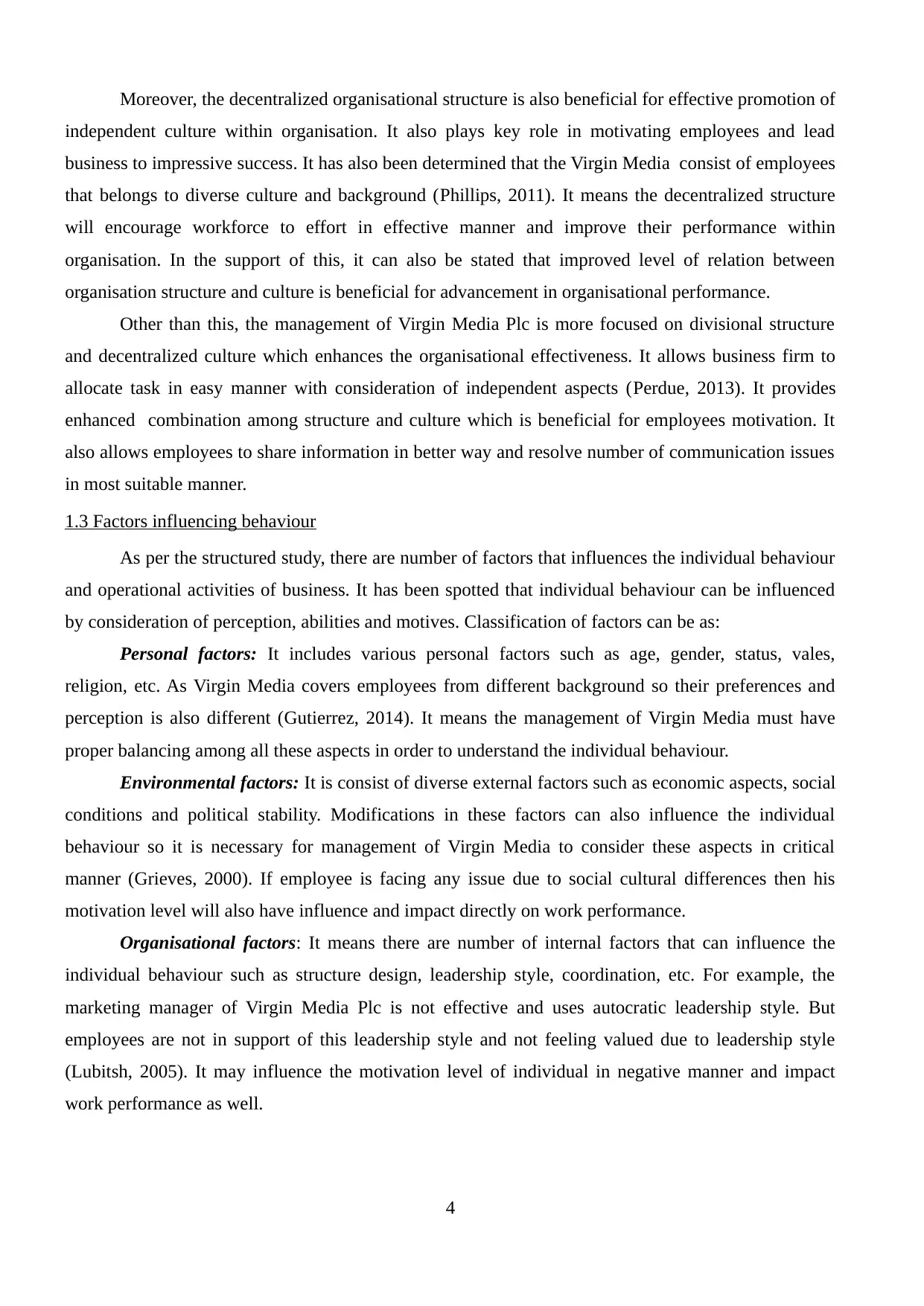
Moreover, the decentralized organisational structure is also beneficial for effective promotion of
independent culture within organisation. It also plays key role in motivating employees and lead
business to impressive success. It has also been determined that the Virgin Media consist of employees
that belongs to diverse culture and background (Phillips, 2011). It means the decentralized structure
will encourage workforce to effort in effective manner and improve their performance within
organisation. In the support of this, it can also be stated that improved level of relation between
organisation structure and culture is beneficial for advancement in organisational performance.
Other than this, the management of Virgin Media Plc is more focused on divisional structure
and decentralized culture which enhances the organisational effectiveness. It allows business firm to
allocate task in easy manner with consideration of independent aspects (Perdue, 2013). It provides
enhanced combination among structure and culture which is beneficial for employees motivation. It
also allows employees to share information in better way and resolve number of communication issues
in most suitable manner.
1.3 Factors influencing behaviour
As per the structured study, there are number of factors that influences the individual behaviour
and operational activities of business. It has been spotted that individual behaviour can be influenced
by consideration of perception, abilities and motives. Classification of factors can be as:
Personal factors: It includes various personal factors such as age, gender, status, vales,
religion, etc. As Virgin Media covers employees from different background so their preferences and
perception is also different (Gutierrez, 2014). It means the management of Virgin Media must have
proper balancing among all these aspects in order to understand the individual behaviour.
Environmental factors: It is consist of diverse external factors such as economic aspects, social
conditions and political stability. Modifications in these factors can also influence the individual
behaviour so it is necessary for management of Virgin Media to consider these aspects in critical
manner (Grieves, 2000). If employee is facing any issue due to social cultural differences then his
motivation level will also have influence and impact directly on work performance.
Organisational factors: It means there are number of internal factors that can influence the
individual behaviour such as structure design, leadership style, coordination, etc. For example, the
marketing manager of Virgin Media Plc is not effective and uses autocratic leadership style. But
employees are not in support of this leadership style and not feeling valued due to leadership style
(Lubitsh, 2005). It may influence the motivation level of individual in negative manner and impact
work performance as well.
4
independent culture within organisation. It also plays key role in motivating employees and lead
business to impressive success. It has also been determined that the Virgin Media consist of employees
that belongs to diverse culture and background (Phillips, 2011). It means the decentralized structure
will encourage workforce to effort in effective manner and improve their performance within
organisation. In the support of this, it can also be stated that improved level of relation between
organisation structure and culture is beneficial for advancement in organisational performance.
Other than this, the management of Virgin Media Plc is more focused on divisional structure
and decentralized culture which enhances the organisational effectiveness. It allows business firm to
allocate task in easy manner with consideration of independent aspects (Perdue, 2013). It provides
enhanced combination among structure and culture which is beneficial for employees motivation. It
also allows employees to share information in better way and resolve number of communication issues
in most suitable manner.
1.3 Factors influencing behaviour
As per the structured study, there are number of factors that influences the individual behaviour
and operational activities of business. It has been spotted that individual behaviour can be influenced
by consideration of perception, abilities and motives. Classification of factors can be as:
Personal factors: It includes various personal factors such as age, gender, status, vales,
religion, etc. As Virgin Media covers employees from different background so their preferences and
perception is also different (Gutierrez, 2014). It means the management of Virgin Media must have
proper balancing among all these aspects in order to understand the individual behaviour.
Environmental factors: It is consist of diverse external factors such as economic aspects, social
conditions and political stability. Modifications in these factors can also influence the individual
behaviour so it is necessary for management of Virgin Media to consider these aspects in critical
manner (Grieves, 2000). If employee is facing any issue due to social cultural differences then his
motivation level will also have influence and impact directly on work performance.
Organisational factors: It means there are number of internal factors that can influence the
individual behaviour such as structure design, leadership style, coordination, etc. For example, the
marketing manager of Virgin Media Plc is not effective and uses autocratic leadership style. But
employees are not in support of this leadership style and not feeling valued due to leadership style
(Lubitsh, 2005). It may influence the motivation level of individual in negative manner and impact
work performance as well.
4
Paraphrase This Document
Need a fresh take? Get an instant paraphrase of this document with our AI Paraphraser
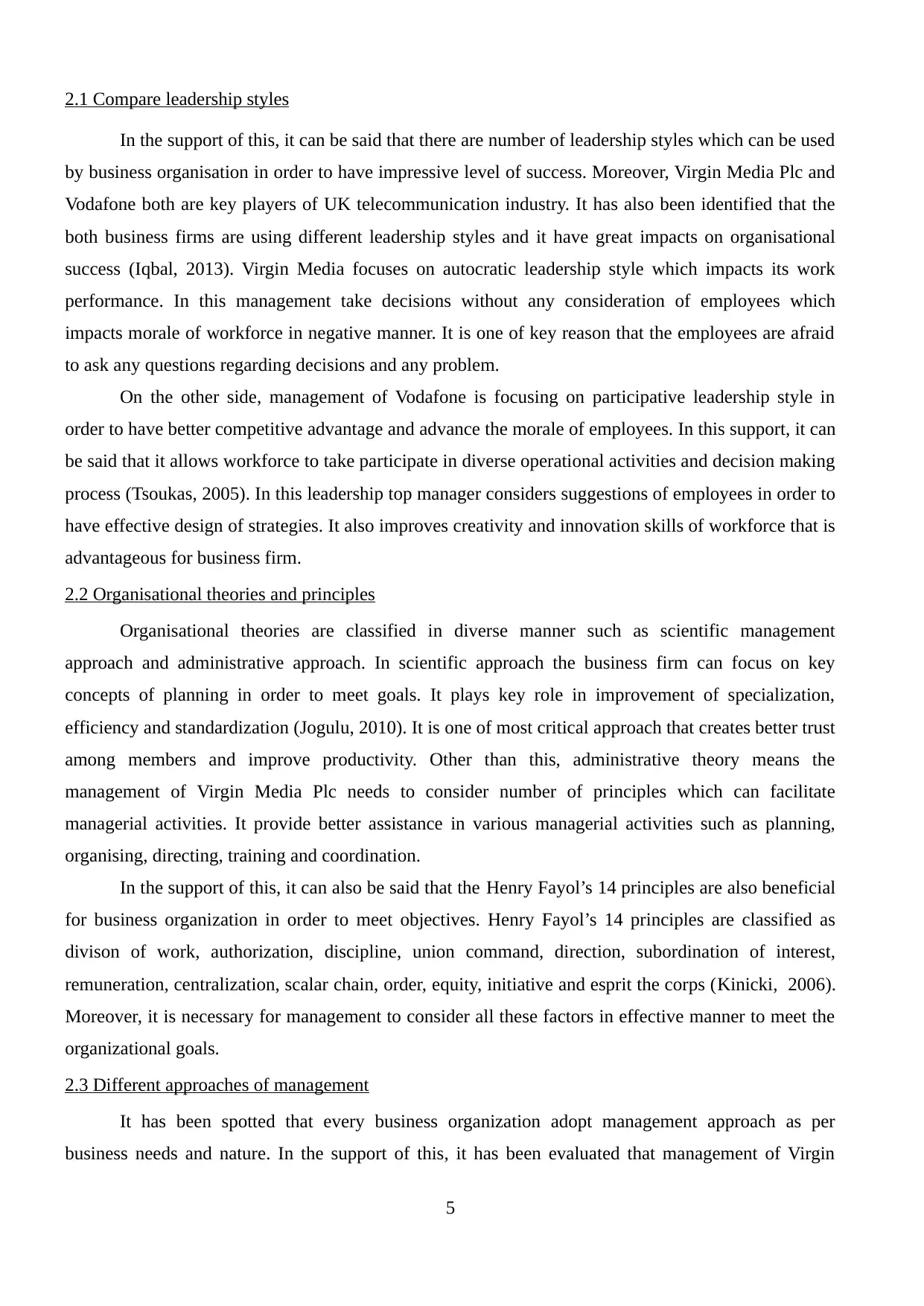
2.1 Compare leadership styles
In the support of this, it can be said that there are number of leadership styles which can be used
by business organisation in order to have impressive level of success. Moreover, Virgin Media Plc and
Vodafone both are key players of UK telecommunication industry. It has also been identified that the
both business firms are using different leadership styles and it have great impacts on organisational
success (Iqbal, 2013). Virgin Media focuses on autocratic leadership style which impacts its work
performance. In this management take decisions without any consideration of employees which
impacts morale of workforce in negative manner. It is one of key reason that the employees are afraid
to ask any questions regarding decisions and any problem.
On the other side, management of Vodafone is focusing on participative leadership style in
order to have better competitive advantage and advance the morale of employees. In this support, it can
be said that it allows workforce to take participate in diverse operational activities and decision making
process (Tsoukas, 2005). In this leadership top manager considers suggestions of employees in order to
have effective design of strategies. It also improves creativity and innovation skills of workforce that is
advantageous for business firm.
2.2 Organisational theories and principles
Organisational theories are classified in diverse manner such as scientific management
approach and administrative approach. In scientific approach the business firm can focus on key
concepts of planning in order to meet goals. It plays key role in improvement of specialization,
efficiency and standardization (Jogulu, 2010). It is one of most critical approach that creates better trust
among members and improve productivity. Other than this, administrative theory means the
management of Virgin Media Plc needs to consider number of principles which can facilitate
managerial activities. It provide better assistance in various managerial activities such as planning,
organising, directing, training and coordination.
In the support of this, it can also be said that the Henry Fayol’s 14 principles are also beneficial
for business organization in order to meet objectives. Henry Fayol’s 14 principles are classified as
divison of work, authorization, discipline, union command, direction, subordination of interest,
remuneration, centralization, scalar chain, order, equity, initiative and esprit the corps (Kinicki, 2006).
Moreover, it is necessary for management to consider all these factors in effective manner to meet the
organizational goals.
2.3 Different approaches of management
It has been spotted that every business organization adopt management approach as per
business needs and nature. In the support of this, it has been evaluated that management of Virgin
5
In the support of this, it can be said that there are number of leadership styles which can be used
by business organisation in order to have impressive level of success. Moreover, Virgin Media Plc and
Vodafone both are key players of UK telecommunication industry. It has also been identified that the
both business firms are using different leadership styles and it have great impacts on organisational
success (Iqbal, 2013). Virgin Media focuses on autocratic leadership style which impacts its work
performance. In this management take decisions without any consideration of employees which
impacts morale of workforce in negative manner. It is one of key reason that the employees are afraid
to ask any questions regarding decisions and any problem.
On the other side, management of Vodafone is focusing on participative leadership style in
order to have better competitive advantage and advance the morale of employees. In this support, it can
be said that it allows workforce to take participate in diverse operational activities and decision making
process (Tsoukas, 2005). In this leadership top manager considers suggestions of employees in order to
have effective design of strategies. It also improves creativity and innovation skills of workforce that is
advantageous for business firm.
2.2 Organisational theories and principles
Organisational theories are classified in diverse manner such as scientific management
approach and administrative approach. In scientific approach the business firm can focus on key
concepts of planning in order to meet goals. It plays key role in improvement of specialization,
efficiency and standardization (Jogulu, 2010). It is one of most critical approach that creates better trust
among members and improve productivity. Other than this, administrative theory means the
management of Virgin Media Plc needs to consider number of principles which can facilitate
managerial activities. It provide better assistance in various managerial activities such as planning,
organising, directing, training and coordination.
In the support of this, it can also be said that the Henry Fayol’s 14 principles are also beneficial
for business organization in order to meet objectives. Henry Fayol’s 14 principles are classified as
divison of work, authorization, discipline, union command, direction, subordination of interest,
remuneration, centralization, scalar chain, order, equity, initiative and esprit the corps (Kinicki, 2006).
Moreover, it is necessary for management to consider all these factors in effective manner to meet the
organizational goals.
2.3 Different approaches of management
It has been spotted that every business organization adopt management approach as per
business needs and nature. In the support of this, it has been evaluated that management of Virgin
5
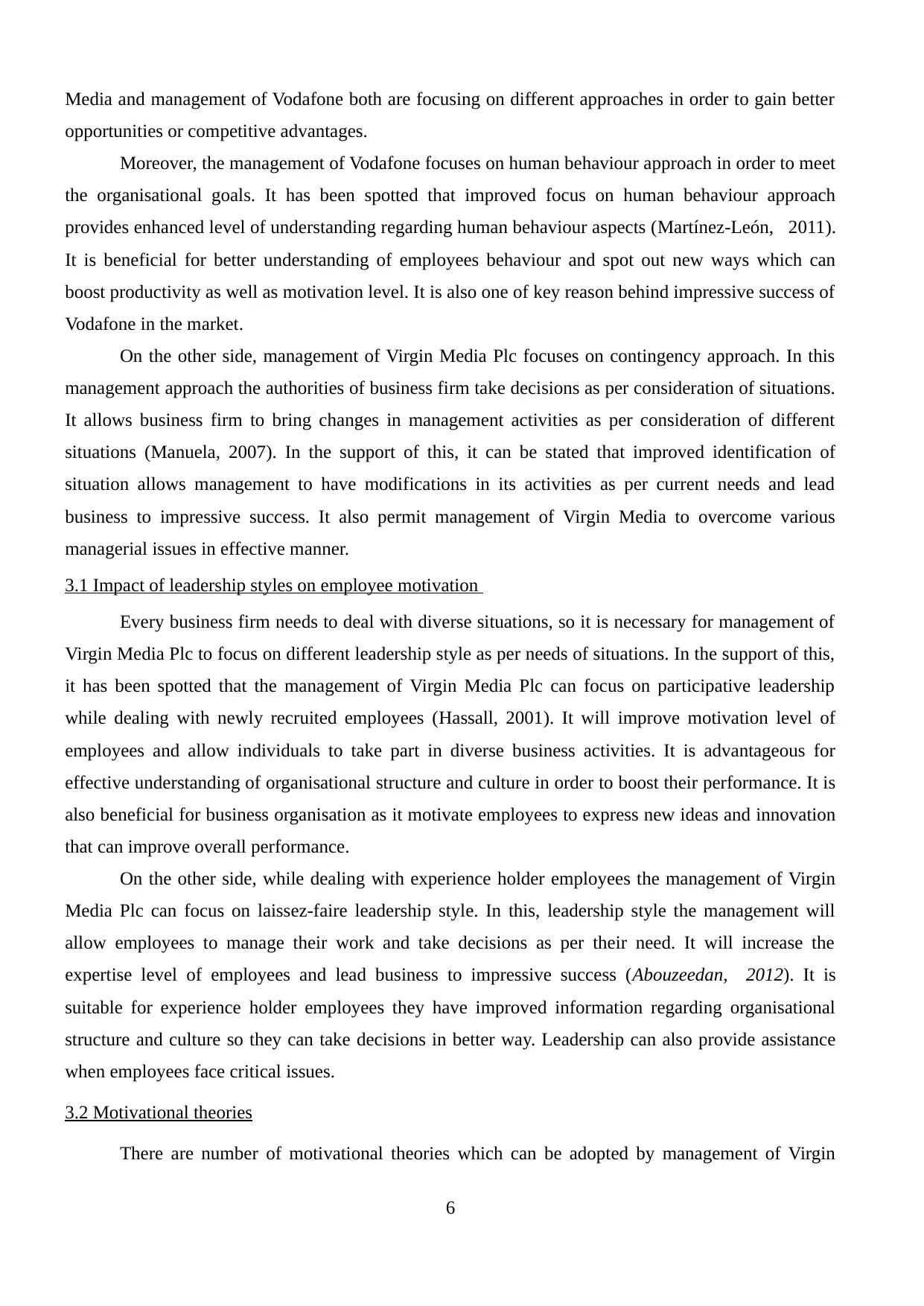
Media and management of Vodafone both are focusing on different approaches in order to gain better
opportunities or competitive advantages.
Moreover, the management of Vodafone focuses on human behaviour approach in order to meet
the organisational goals. It has been spotted that improved focus on human behaviour approach
provides enhanced level of understanding regarding human behaviour aspects (Martínez-León, 2011).
It is beneficial for better understanding of employees behaviour and spot out new ways which can
boost productivity as well as motivation level. It is also one of key reason behind impressive success of
Vodafone in the market.
On the other side, management of Virgin Media Plc focuses on contingency approach. In this
management approach the authorities of business firm take decisions as per consideration of situations.
It allows business firm to bring changes in management activities as per consideration of different
situations (Manuela, 2007). In the support of this, it can be stated that improved identification of
situation allows management to have modifications in its activities as per current needs and lead
business to impressive success. It also permit management of Virgin Media to overcome various
managerial issues in effective manner.
3.1 Impact of leadership styles on employee motivation
Every business firm needs to deal with diverse situations, so it is necessary for management of
Virgin Media Plc to focus on different leadership style as per needs of situations. In the support of this,
it has been spotted that the management of Virgin Media Plc can focus on participative leadership
while dealing with newly recruited employees (Hassall, 2001). It will improve motivation level of
employees and allow individuals to take part in diverse business activities. It is advantageous for
effective understanding of organisational structure and culture in order to boost their performance. It is
also beneficial for business organisation as it motivate employees to express new ideas and innovation
that can improve overall performance.
On the other side, while dealing with experience holder employees the management of Virgin
Media Plc can focus on laissez-faire leadership style. In this, leadership style the management will
allow employees to manage their work and take decisions as per their need. It will increase the
expertise level of employees and lead business to impressive success (Abouzeedan, 2012). It is
suitable for experience holder employees they have improved information regarding organisational
structure and culture so they can take decisions in better way. Leadership can also provide assistance
when employees face critical issues.
3.2 Motivational theories
There are number of motivational theories which can be adopted by management of Virgin
6
opportunities or competitive advantages.
Moreover, the management of Vodafone focuses on human behaviour approach in order to meet
the organisational goals. It has been spotted that improved focus on human behaviour approach
provides enhanced level of understanding regarding human behaviour aspects (Martínez-León, 2011).
It is beneficial for better understanding of employees behaviour and spot out new ways which can
boost productivity as well as motivation level. It is also one of key reason behind impressive success of
Vodafone in the market.
On the other side, management of Virgin Media Plc focuses on contingency approach. In this
management approach the authorities of business firm take decisions as per consideration of situations.
It allows business firm to bring changes in management activities as per consideration of different
situations (Manuela, 2007). In the support of this, it can be stated that improved identification of
situation allows management to have modifications in its activities as per current needs and lead
business to impressive success. It also permit management of Virgin Media to overcome various
managerial issues in effective manner.
3.1 Impact of leadership styles on employee motivation
Every business firm needs to deal with diverse situations, so it is necessary for management of
Virgin Media Plc to focus on different leadership style as per needs of situations. In the support of this,
it has been spotted that the management of Virgin Media Plc can focus on participative leadership
while dealing with newly recruited employees (Hassall, 2001). It will improve motivation level of
employees and allow individuals to take part in diverse business activities. It is advantageous for
effective understanding of organisational structure and culture in order to boost their performance. It is
also beneficial for business organisation as it motivate employees to express new ideas and innovation
that can improve overall performance.
On the other side, while dealing with experience holder employees the management of Virgin
Media Plc can focus on laissez-faire leadership style. In this, leadership style the management will
allow employees to manage their work and take decisions as per their need. It will increase the
expertise level of employees and lead business to impressive success (Abouzeedan, 2012). It is
suitable for experience holder employees they have improved information regarding organisational
structure and culture so they can take decisions in better way. Leadership can also provide assistance
when employees face critical issues.
3.2 Motivational theories
There are number of motivational theories which can be adopted by management of Virgin
6
⊘ This is a preview!⊘
Do you want full access?
Subscribe today to unlock all pages.

Trusted by 1+ million students worldwide
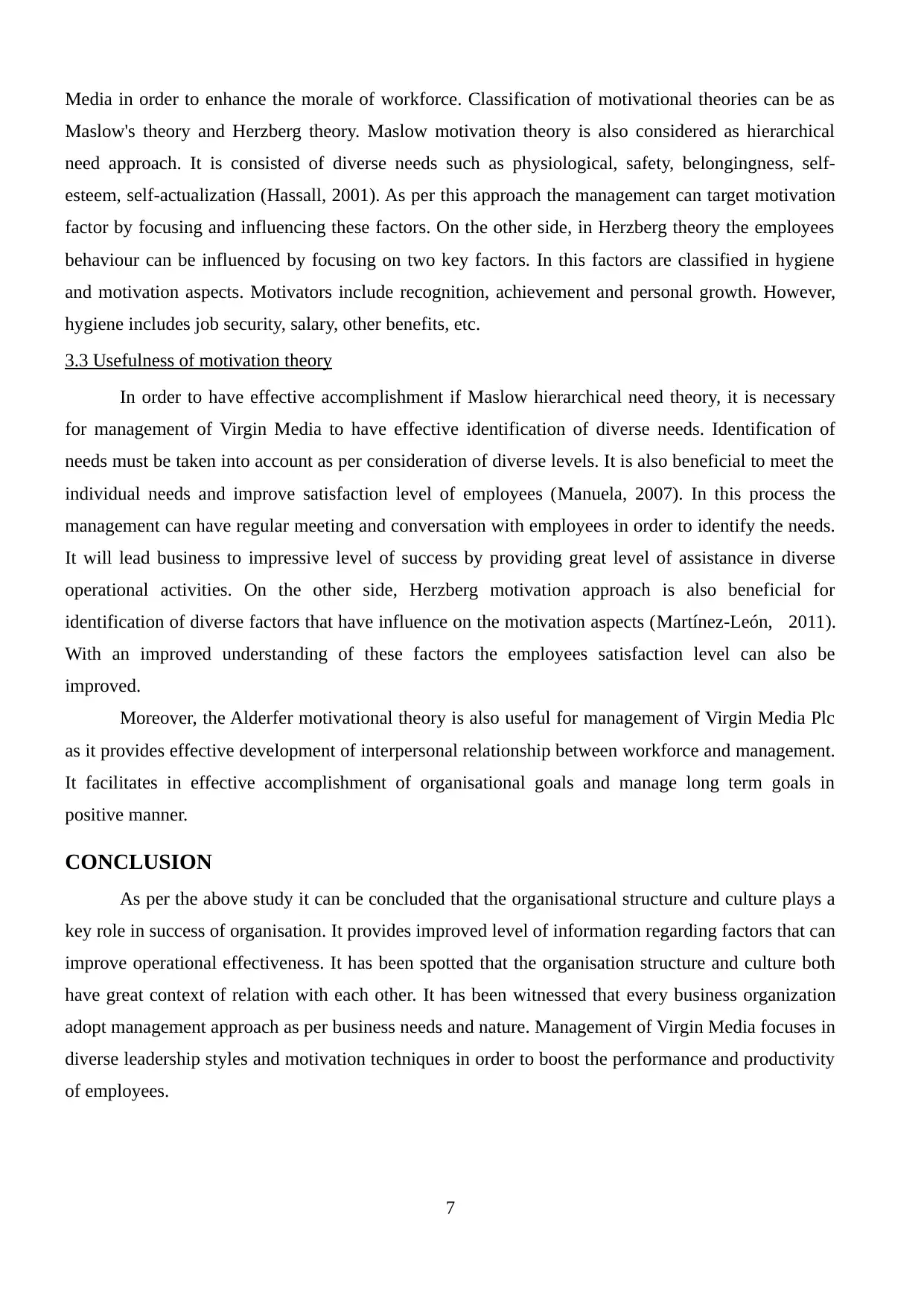
Media in order to enhance the morale of workforce. Classification of motivational theories can be as
Maslow's theory and Herzberg theory. Maslow motivation theory is also considered as hierarchical
need approach. It is consisted of diverse needs such as physiological, safety, belongingness, self-
esteem, self-actualization (Hassall, 2001). As per this approach the management can target motivation
factor by focusing and influencing these factors. On the other side, in Herzberg theory the employees
behaviour can be influenced by focusing on two key factors. In this factors are classified in hygiene
and motivation aspects. Motivators include recognition, achievement and personal growth. However,
hygiene includes job security, salary, other benefits, etc.
3.3 Usefulness of motivation theory
In order to have effective accomplishment if Maslow hierarchical need theory, it is necessary
for management of Virgin Media to have effective identification of diverse needs. Identification of
needs must be taken into account as per consideration of diverse levels. It is also beneficial to meet the
individual needs and improve satisfaction level of employees (Manuela, 2007). In this process the
management can have regular meeting and conversation with employees in order to identify the needs.
It will lead business to impressive level of success by providing great level of assistance in diverse
operational activities. On the other side, Herzberg motivation approach is also beneficial for
identification of diverse factors that have influence on the motivation aspects (Martínez-León, 2011).
With an improved understanding of these factors the employees satisfaction level can also be
improved.
Moreover, the Alderfer motivational theory is also useful for management of Virgin Media Plc
as it provides effective development of interpersonal relationship between workforce and management.
It facilitates in effective accomplishment of organisational goals and manage long term goals in
positive manner.
CONCLUSION
As per the above study it can be concluded that the organisational structure and culture plays a
key role in success of organisation. It provides improved level of information regarding factors that can
improve operational effectiveness. It has been spotted that the organisation structure and culture both
have great context of relation with each other. It has been witnessed that every business organization
adopt management approach as per business needs and nature. Management of Virgin Media focuses in
diverse leadership styles and motivation techniques in order to boost the performance and productivity
of employees.
7
Maslow's theory and Herzberg theory. Maslow motivation theory is also considered as hierarchical
need approach. It is consisted of diverse needs such as physiological, safety, belongingness, self-
esteem, self-actualization (Hassall, 2001). As per this approach the management can target motivation
factor by focusing and influencing these factors. On the other side, in Herzberg theory the employees
behaviour can be influenced by focusing on two key factors. In this factors are classified in hygiene
and motivation aspects. Motivators include recognition, achievement and personal growth. However,
hygiene includes job security, salary, other benefits, etc.
3.3 Usefulness of motivation theory
In order to have effective accomplishment if Maslow hierarchical need theory, it is necessary
for management of Virgin Media to have effective identification of diverse needs. Identification of
needs must be taken into account as per consideration of diverse levels. It is also beneficial to meet the
individual needs and improve satisfaction level of employees (Manuela, 2007). In this process the
management can have regular meeting and conversation with employees in order to identify the needs.
It will lead business to impressive level of success by providing great level of assistance in diverse
operational activities. On the other side, Herzberg motivation approach is also beneficial for
identification of diverse factors that have influence on the motivation aspects (Martínez-León, 2011).
With an improved understanding of these factors the employees satisfaction level can also be
improved.
Moreover, the Alderfer motivational theory is also useful for management of Virgin Media Plc
as it provides effective development of interpersonal relationship between workforce and management.
It facilitates in effective accomplishment of organisational goals and manage long term goals in
positive manner.
CONCLUSION
As per the above study it can be concluded that the organisational structure and culture plays a
key role in success of organisation. It provides improved level of information regarding factors that can
improve operational effectiveness. It has been spotted that the organisation structure and culture both
have great context of relation with each other. It has been witnessed that every business organization
adopt management approach as per business needs and nature. Management of Virgin Media focuses in
diverse leadership styles and motivation techniques in order to boost the performance and productivity
of employees.
7
Paraphrase This Document
Need a fresh take? Get an instant paraphrase of this document with our AI Paraphraser
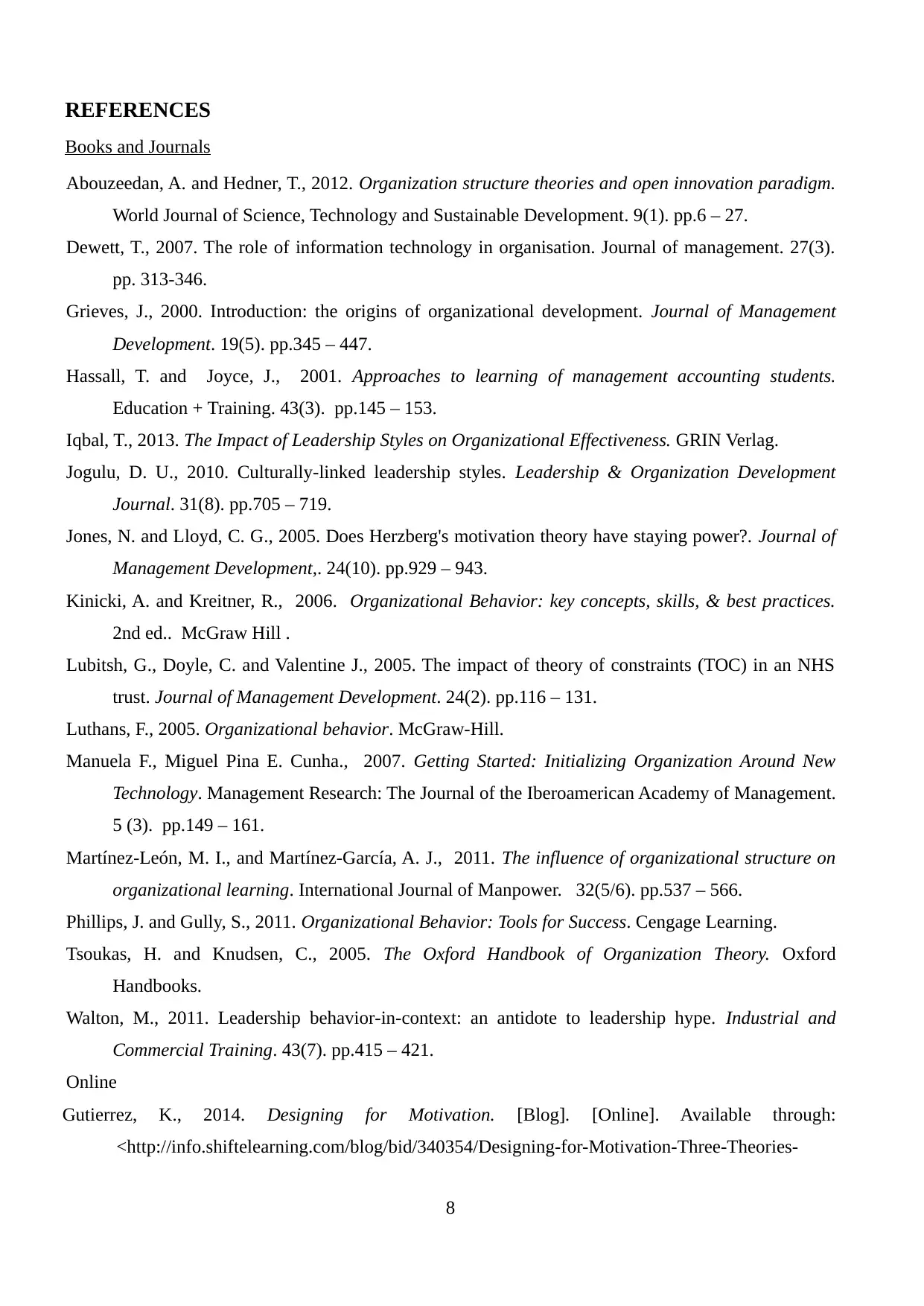
REFERENCES
Books and Journals
Abouzeedan, A. and Hedner, T., 2012. Organization structure theories and open innovation paradigm.
World Journal of Science, Technology and Sustainable Development. 9(1). pp.6 – 27.
Dewett, T., 2007. The role of information technology in organisation. Journal of management. 27(3).
pp. 313-346.
Grieves, J., 2000. Introduction: the origins of organizational development. Journal of Management
Development. 19(5). pp.345 – 447.
Hassall, T. and Joyce, J., 2001. Approaches to learning of management accounting students.
Education + Training. 43(3). pp.145 – 153.
Iqbal, T., 2013. The Impact of Leadership Styles on Organizational Effectiveness. GRIN Verlag.
Jogulu, D. U., 2010. Culturally‐linked leadership styles. Leadership & Organization Development
Journal. 31(8). pp.705 – 719.
Jones, N. and Lloyd, C. G., 2005. Does Herzberg's motivation theory have staying power?. Journal of
Management Development,. 24(10). pp.929 – 943.
Kinicki, A. and Kreitner, R., 2006. Organizational Behavior: key concepts, skills, & best practices.
2nd ed.. McGraw Hill .
Lubitsh, G., Doyle, C. and Valentine J., 2005. The impact of theory of constraints (TOC) in an NHS
trust. Journal of Management Development. 24(2). pp.116 – 131.
Luthans, F., 2005. Organizational behavior. McGraw-Hill.
Manuela F., Miguel Pina E. Cunha., 2007. Getting Started: Initializing Organization Around New
Technology. Management Research: The Journal of the Iberoamerican Academy of Management.
5 (3). pp.149 – 161.
Martínez-León, M. I., and Martínez-García, A. J., 2011. The influence of organizational structure on
organizational learning. International Journal of Manpower. 32(5/6). pp.537 – 566.
Phillips, J. and Gully, S., 2011. Organizational Behavior: Tools for Success. Cengage Learning.
Tsoukas, H. and Knudsen, C., 2005. The Oxford Handbook of Organization Theory. Oxford
Handbooks.
Walton, M., 2011. Leadership behavior‐in‐context: an antidote to leadership hype. Industrial and
Commercial Training. 43(7). pp.415 – 421.
Online
Gutierrez, K., 2014. Designing for Motivation. [Blog]. [Online]. Available through:
<http://info.shiftelearning.com/blog/bid/340354/Designing-for-Motivation-Three-Theories-
8
Books and Journals
Abouzeedan, A. and Hedner, T., 2012. Organization structure theories and open innovation paradigm.
World Journal of Science, Technology and Sustainable Development. 9(1). pp.6 – 27.
Dewett, T., 2007. The role of information technology in organisation. Journal of management. 27(3).
pp. 313-346.
Grieves, J., 2000. Introduction: the origins of organizational development. Journal of Management
Development. 19(5). pp.345 – 447.
Hassall, T. and Joyce, J., 2001. Approaches to learning of management accounting students.
Education + Training. 43(3). pp.145 – 153.
Iqbal, T., 2013. The Impact of Leadership Styles on Organizational Effectiveness. GRIN Verlag.
Jogulu, D. U., 2010. Culturally‐linked leadership styles. Leadership & Organization Development
Journal. 31(8). pp.705 – 719.
Jones, N. and Lloyd, C. G., 2005. Does Herzberg's motivation theory have staying power?. Journal of
Management Development,. 24(10). pp.929 – 943.
Kinicki, A. and Kreitner, R., 2006. Organizational Behavior: key concepts, skills, & best practices.
2nd ed.. McGraw Hill .
Lubitsh, G., Doyle, C. and Valentine J., 2005. The impact of theory of constraints (TOC) in an NHS
trust. Journal of Management Development. 24(2). pp.116 – 131.
Luthans, F., 2005. Organizational behavior. McGraw-Hill.
Manuela F., Miguel Pina E. Cunha., 2007. Getting Started: Initializing Organization Around New
Technology. Management Research: The Journal of the Iberoamerican Academy of Management.
5 (3). pp.149 – 161.
Martínez-León, M. I., and Martínez-García, A. J., 2011. The influence of organizational structure on
organizational learning. International Journal of Manpower. 32(5/6). pp.537 – 566.
Phillips, J. and Gully, S., 2011. Organizational Behavior: Tools for Success. Cengage Learning.
Tsoukas, H. and Knudsen, C., 2005. The Oxford Handbook of Organization Theory. Oxford
Handbooks.
Walton, M., 2011. Leadership behavior‐in‐context: an antidote to leadership hype. Industrial and
Commercial Training. 43(7). pp.415 – 421.
Online
Gutierrez, K., 2014. Designing for Motivation. [Blog]. [Online]. Available through:
<http://info.shiftelearning.com/blog/bid/340354/Designing-for-Motivation-Three-Theories-
8
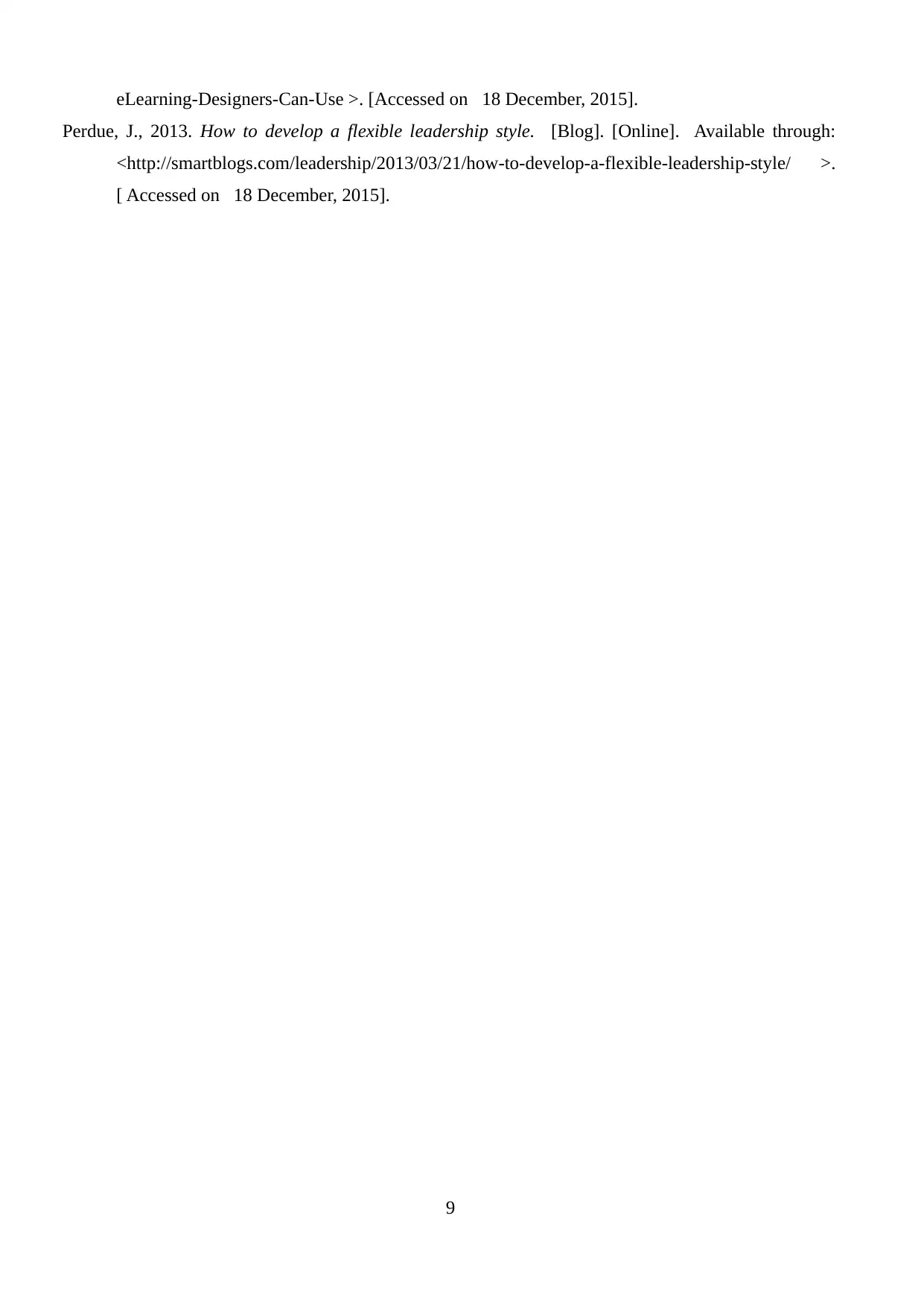
eLearning-Designers-Can-Use >. [Accessed on 18 December, 2015].
Perdue, J., 2013. How to develop a flexible leadership style. [Blog]. [Online]. Available through:
<http://smartblogs.com/leadership/2013/03/21/how-to-develop-a-flexible-leadership-style/ >.
[ Accessed on 18 December, 2015].
9
Perdue, J., 2013. How to develop a flexible leadership style. [Blog]. [Online]. Available through:
<http://smartblogs.com/leadership/2013/03/21/how-to-develop-a-flexible-leadership-style/ >.
[ Accessed on 18 December, 2015].
9
⊘ This is a preview!⊘
Do you want full access?
Subscribe today to unlock all pages.

Trusted by 1+ million students worldwide

Page | 10
1 out of 10
Related Documents
Your All-in-One AI-Powered Toolkit for Academic Success.
+13062052269
info@desklib.com
Available 24*7 on WhatsApp / Email
![[object Object]](/_next/static/media/star-bottom.7253800d.svg)
Unlock your academic potential
Copyright © 2020–2026 A2Z Services. All Rights Reserved. Developed and managed by ZUCOL.





